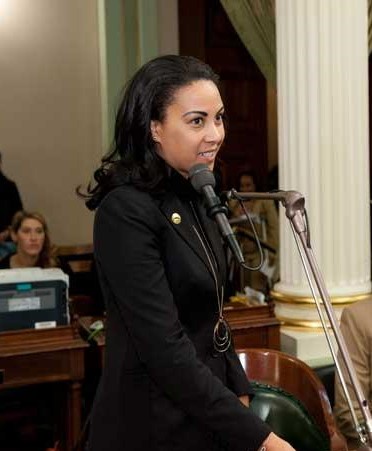For the legislative and political week February 1-5
Welcome to the February 1 edition of the NFIB California Main Street Minute from your small-business advocacy team in Sacramento.
- On Thursday, January 28, NFIB and the National Retail Federation’s request for a temporary restraining order against the new Cal/OSHA workplace regulations received its first hearing in a San Francisco Superior Court.
- According to a news story by Law360, “The National Retail Federation, the National Federation of Independent Businesses and a group of small businesses brought their suit against Cal/OSHA in December, contending that the government agency failed to rely on science and exceeded its authority when implementing California’s Emergency Temporary Standards, which went into effect Nov. 30. … Under the rules, if multiple COVID-19 infections or an outbreak occur at a workplace, California employers must provide free testing to employees who might have been exposed. Employers must also give exposed workers paid leave to prevent the spread of the virus to other employees and the public.”
- Karen Harned, executive director of the NFIB Small Business Legal Center, and John Kabateck, NFIB’s California state director, co-authored a guest editorial explaining why NFIB acted. “California state law requires that Cal/OSHA follow a specific process before issuing new mandates. … A pandemic doesn’t suddenly give unelected bureaucrats legal authority not previously given to them by the Legislature or the people.”
- In addition to the guest editorial’s publication by The Fresno Bee, it also ran in 10 daily newspapers owned by the Southern California News Group.
- As for last week’s recommendation by the state legislative analyst that lawmakers reject Gov. Gavin Newsom’s proposal to expand the state’s economic development incentive program, Kabateck shared his thoughts with Politico California.
- Tax Conformity! Keep your eyes on Assembly Bill 281 by Assembly Member Autumn Burke (D-Inglewood). It would conform state tax treatment of PPP loans to the federal government’s treatment of them. “With tax time around the corner, all expectations are this bill gets fast-tracked,” said NFIB’s chief legislative advocate Kevin Pedrotti. NFIB California is part of a broad coalition to get this measure passed.
- Speaking of PPP loans, “More Than 620,000 California businesses received PPP loans through August 2020,” reports the state’s nonpartisan legislative analyst (LAO). “The federal Small Business Administration (SBA) reports that just over 620,000 small businesses and nonprofit organizations in California received PPP loans in the first round that closed in August. The average PPP loan was $110,120. We estimate that small businesses in California that received a PPP loan contribute roughly $800 billion to the state.”
- The state has tried to do its part but only has had mixed results according to the LAO’s report, The 2021-22 Budget Small Business Grants.
- Last week’s release of State Auditor Elaine Howle’s exhaustive report on California’s Employment Development Department quantified just how badly the state agency managed unemployment insurance claims. “EDD’s data show that out of a total $111 billion paid during the pandemic, from March 2020 through December 2020, it paid about $10.4 billion for claims that it has since determined could be fraudulent. … The most egregious example from this analysis was a case of more than 1,700 claims going to a single address.”
- Unemployment benefits are paid by the state’s Unemployment Insurance Trust Fund from taxes on business owners. California is one of 21 states in hock to the federal government for loans to keep its UI Trust Fund solvent, and, as of January 28, had just under $19 billion in its “Outstanding Advance Balance” account.
- To keep small-business owners out of harm’s way from facing whopping increases in their UI taxes, some states have used federal CARES Act money to shore up their UI Trust Funds. But in another state auditor’s report, you’ll not find a cent going into California’s UI Trust Fund from the $9.5 billion allocated for discretionary spending. Neither will you find it in this recent report from the state legislative analyst, The 2021-22 Budget, Golden State Stimulus.
- The LAO’s report did have this nugget, however: “The federal government took early steps to boost UI benefits and extend benefits to self-employed workers. In 2020, the state regularly distributed $5 billion in UI benefits per week (for comparison, under normal conditions, the state typically distributes about $100 million per week). Expanded benefits also replaced a larger share of workers’ lost earnings. An unemployed minimum wage worker, who normally makes $520 per week, received $860 per week in the spring and summer under the federal increase and will receive $560 per week under the recent federal extension. Today, more than 4 million Californians continue to receive UI benefits.”
- Happy Birthday! The NFIB California Main Street Minute is now one year old. We hope you’ve found them informative and are always open to suggestions on how to improve them.
Nationally,
- NFIB needs immediate action from its members to contact their representatives and senators here to make known your opposition to the Raise the Wage Act of 2021 (H.R 603 and S. 53), which would institute a $15 an hour minimum wage rate. For more information, visit NFIB.com/minimumwage.
- This week, NFIB will release its 15th survey in the COVID-19 series.
- The next webinar, Updates from SBA Lending Specialists, is on February 10.
Next Main Street Minute, February 8.

